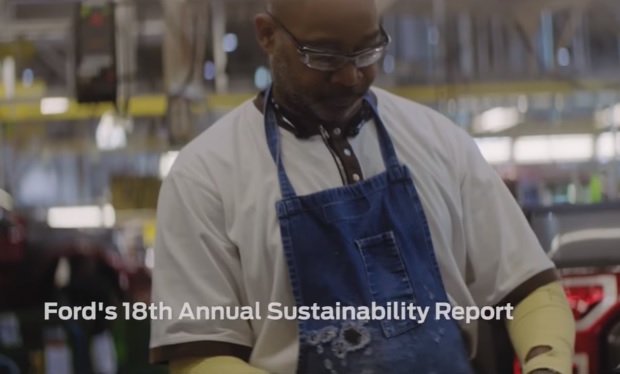Ford’s 18th annual sustainability report: Ford Motor Co. announced a series of gains made in sustainability initiatives in its annual report. The automaker joined the Business Alliance for Water and Climate “Improve Water Security” initiative supporting its drive to someday have zero usage of  drinkable water in manufacturing. Since 2000, Ford has cut water use by more than 61 percent. It’s partnership with Jose Cuervo continued using agave plants for sustainable bioplastics being placed in Ford vehicles. Now about 300 vehicle parts come from renewable sources such as soybeans, cotton, wood, flax, jute, and natural rubber. Its aluminum closed-loop recycling system recycles about 20 million pounds of military-grade aluminum alloy per month, enough to build more than 37,000 F-Series truck bodies a month. Ford continues to reduce the footprint of its supply chain with an enhanced Partnership for a Cleaner Environment program that has grown to more than 40 suppliers in 40 countries – up from 25 suppliers in 2015. The automakers zero-waste-to-landfill program has been expanded to a total of 82 Ford facilities around the world, where no waste is sent to landfills. You can read the company’s 18th annual sustainability report to learn more, plus read and watch a video on improving safety and fuel economy, reducing manufacturing carbon dioxide, the company global electrification strategy, and sustainable mobility services.
drinkable water in manufacturing. Since 2000, Ford has cut water use by more than 61 percent. It’s partnership with Jose Cuervo continued using agave plants for sustainable bioplastics being placed in Ford vehicles. Now about 300 vehicle parts come from renewable sources such as soybeans, cotton, wood, flax, jute, and natural rubber. Its aluminum closed-loop recycling system recycles about 20 million pounds of military-grade aluminum alloy per month, enough to build more than 37,000 F-Series truck bodies a month. Ford continues to reduce the footprint of its supply chain with an enhanced Partnership for a Cleaner Environment program that has grown to more than 40 suppliers in 40 countries – up from 25 suppliers in 2015. The automakers zero-waste-to-landfill program has been expanded to a total of 82 Ford facilities around the world, where no waste is sent to landfills. You can read the company’s 18th annual sustainability report to learn more, plus read and watch a video on improving safety and fuel economy, reducing manufacturing carbon dioxide, the company global electrification strategy, and sustainable mobility services.
Webcast on PEV sales: On Sept. 12, UCLA, J R DeShazo, director of UCLA’s Luskin Center, will lead a webcast from Sacramento on the future of the plug-in electric vehicle market. Details on a new study will focus on the early development of the market and the factors likely to shape future growth ties into California’s public policy goals for clean vehicle sales. The study examined consumer response to PEV market offerings and tested hypotheses about potential determinants of PEV sales over time and across locations in California.
Tesla Semi range: Tesla will be launching a semi-truck next month capable of going 200 to 300 miles per charge, according to Scott Perry, a Ryder System executive interviewed by Reuters. Perry  said he met with Tesla earlier this year to discuss what the Tesla Semi truck will be like that CEO Elon Musk announced last year and said would be revealed in September. It will be ideal for short-haul trucking and won’t have anything like the capacity of 1000-miles per fueling big rigs typically seen on U.S. highways. The Tesla Semi could work for companies needing freight hauling from ports to warehouses and other day trips. Tesla will face a series of challenges including ramping up later this year for the Tesla Model 3.
said he met with Tesla earlier this year to discuss what the Tesla Semi truck will be like that CEO Elon Musk announced last year and said would be revealed in September. It will be ideal for short-haul trucking and won’t have anything like the capacity of 1000-miles per fueling big rigs typically seen on U.S. highways. The Tesla Semi could work for companies needing freight hauling from ports to warehouses and other day trips. Tesla will face a series of challenges including ramping up later this year for the Tesla Model 3.
